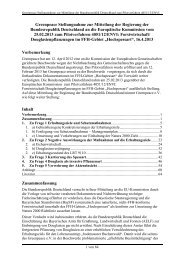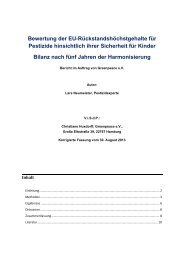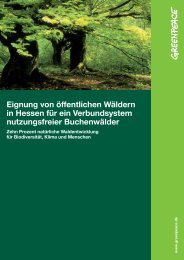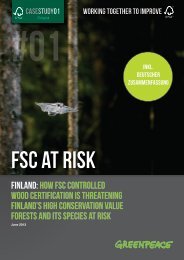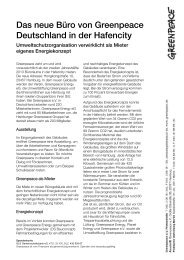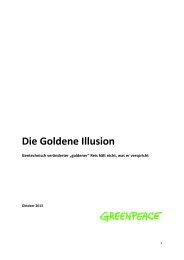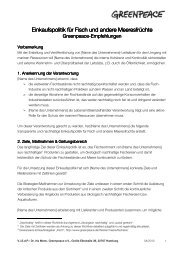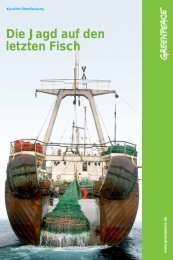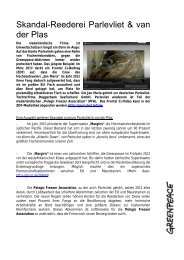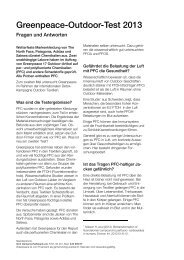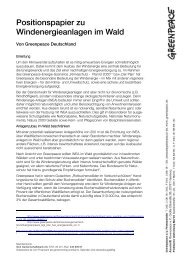Consuming Canada's Boreal Forest: The chain of ... - Greenpeace
Consuming Canada's Boreal Forest: The chain of ... - Greenpeace
Consuming Canada's Boreal Forest: The chain of ... - Greenpeace
You also want an ePaper? Increase the reach of your titles
YUMPU automatically turns print PDFs into web optimized ePapers that Google loves.
26<br />
<strong>The</strong> Provinces<br />
<strong>of</strong> Ontario<br />
and Quebec:<br />
<strong>The</strong> Heart<br />
<strong>of</strong> <strong>Boreal</strong><br />
Destruction<br />
<strong>Forest</strong> Lost in<br />
Quebec and Ontario<br />
<strong>Greenpeace</strong><br />
<strong>The</strong> two most critical and threatened<br />
areas <strong>of</strong> the intact <strong>Boreal</strong> <strong>Forest</strong> lie in<br />
the northern latitudes <strong>of</strong> the Canadian<br />
provinces <strong>of</strong> Ontario and Quebec. Owned<br />
by the provinces, who hold the forests in<br />
trust for their citizens and who dictate the<br />
management <strong>of</strong> the forests, these areas<br />
have many highly valuable attributes and<br />
are home to critical caribou habitat and<br />
large carbon reservoirs.<br />
Unfortunately, the scale <strong>of</strong> destruction<br />
in these last remaining intact areas is massive<br />
and happening rapidly, and because <strong>of</strong> this<br />
there is little time to waste. <strong>The</strong> destruction<br />
is being led by a handful <strong>of</strong> logging companies<br />
who have been allocated vast<br />
tracts under licenses issued by the<br />
provinces. <strong>The</strong>se companies feed the<br />
demand from the international and<br />
Canadian marketplace.<br />
In 2005, Ontario exported CDN$8.1<br />
billion (US$7.8 billion) <strong>of</strong> forest products<br />
to the United States and CDN$92 million<br />
(US$88.2 million) to Europe. Quebec<br />
exported CDN$10 billion (US$9.6 billion) <strong>of</strong><br />
forest products to the United States and<br />
CDN$684 million (US$655 million) to Europe<br />
that same year .1 More than 25 million cubic<br />
meters and 43 million cubic meters <strong>of</strong><br />
roundwood was harvested from Ontario<br />
and Quebec respectively in 2004, with<br />
most <strong>of</strong> this coming from the <strong>Boreal</strong><br />
<strong>Forest</strong>. 2 Thus a mammoth amount <strong>of</strong><br />
<strong>Boreal</strong> <strong>Forest</strong> products is being consumed<br />
in the US and European markets and this is<br />
having a devastating effect in this region.<br />
As logging increases, the chances <strong>of</strong> preserving<br />
large intact areas <strong>of</strong> <strong>Boreal</strong> <strong>Forest</strong><br />
diminish significantly.<br />
<strong>The</strong> largest clearcut in the Quebec region surveyed<br />
by Global <strong>Forest</strong> Watch covered an area equal to<br />
approximately seventeen times the size <strong>of</strong> the Island<br />
<strong>of</strong> Manhattan.<br />
82 per cent <strong>of</strong> the <strong>Boreal</strong> <strong>Forest</strong> in Ontario has been<br />
fragmented or degraded.<br />
86 per cent <strong>of</strong> the <strong>Boreal</strong> <strong>Forest</strong> in Quebec has been<br />
fragmented or degraded.<br />
Only 9 per cent <strong>of</strong> the <strong>Boreal</strong> <strong>Forest</strong> in Ontario is<br />
protected from industrial development and further<br />
fragmentation.<br />
Less than 5 per cent <strong>of</strong> the <strong>Boreal</strong> <strong>Forest</strong> in<br />
Quebec is protected from development and further<br />
fragmentation.<br />
In a twelve-year study period from 1989<br />
to 2001, according to satellite mapping<br />
and analyses done by Global <strong>Forest</strong><br />
Watch Canada, nearly one million hectares<br />
<strong>of</strong> forest in Quebec and 500,000 hectares <strong>of</strong><br />
forest in Ontario had been fragmented<br />
due to logging and other development. 3<br />
This damage to intact forest areas, driven<br />
by the abovementioned global demand<br />
for paper and lumber products, has been<br />
occurring for so long and to such an<br />
extent that less than 14 per cent <strong>of</strong> the<br />
intact <strong>Boreal</strong> <strong>Forest</strong> in Quebec and 18<br />
per cent in Ontario remains. 4<br />
In February 2007, the Commission for<br />
Environmental Cooperation, an international<br />
body created by the governments <strong>of</strong><br />
Canada, Mexico and the United States to<br />
promote the effective enforcement <strong>of</strong> envi-<br />
ronmental law, found serious deficiencies in<br />
Ontario’s management <strong>of</strong> its public forests<br />
to protect wildlife. 5 In Quebec the situation<br />
is similar, with the Commission for the<br />
Study <strong>of</strong> Public <strong>Forest</strong> Management in<br />
Quebec, better known as the Coulombe<br />
Commission, reporting in December 2004<br />
that all forests in the province had been<br />
over-harvested and recommending an aver-<br />
age 20 per cent reduction in allowable cut<br />
levels. <strong>The</strong> Commission also recommended<br />
that eight per cent <strong>of</strong> the province’s <strong>Boreal</strong><br />
<strong>Forest</strong> be protected by 2006, and that 12<br />
per cent <strong>of</strong> the <strong>Boreal</strong> <strong>Forest</strong> be protected<br />
by 2010. 6 As <strong>of</strong> July 2007, less than five<br />
per cent <strong>of</strong> the <strong>Boreal</strong> in Quebec is protected<br />
from development.<br />
Because the companies operating in<br />
these forests are essentially renting the<br />
land from the people <strong>of</strong> Ontario and<br />
Quebec, <strong>Greenpeace</strong> believes they have<br />
a duty to maintain the forests as healthy<br />
ecosystems and ensure the long-term<br />
sustainability <strong>of</strong> these public lands on<br />
which they operate. Furthermore, much<br />
<strong>of</strong> public land, known as Crown Land, is<br />
in dispute and under land claim by many<br />
First Nations communities, who cite treaty<br />
and tradional rights. As stewards <strong>of</strong> the<br />
forests, the Ontario and Quebec governments<br />
have a duty to ensure that logging<br />
companies are fulfilling these obligations.<br />
Unfortunately these governments are not<br />
taking their responsibilities seriously and<br />
the <strong>Boreal</strong> <strong>Forest</strong> is paying the price.<br />
<strong>Consuming</strong> <strong>Canada's</strong> <strong>Boreal</strong> <strong>Forest</strong>: <strong>The</strong> <strong>chain</strong> <strong>of</strong> destruction from logging companies to consumers



